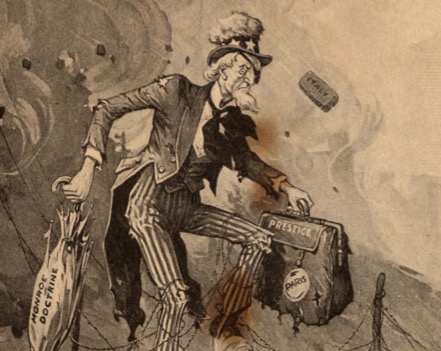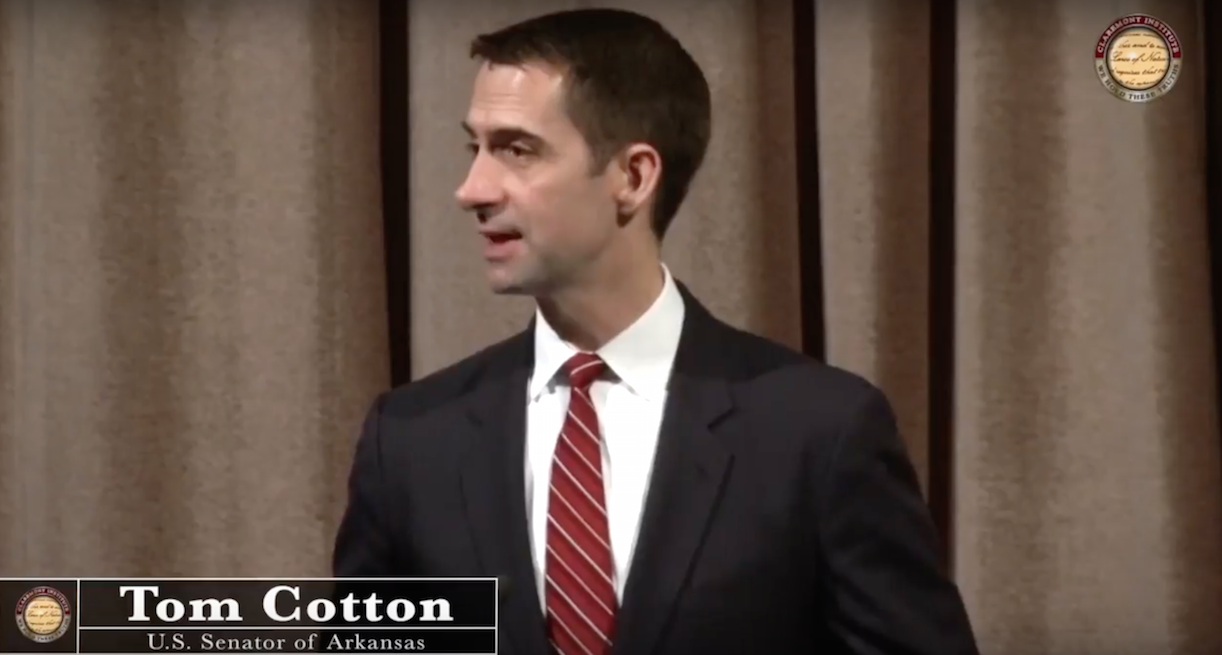America’s superior power is not a moral entitlement.
Borders Or Bust

Radical self-definition destroys the self and the nation.
Beginning in 2016, anti-Trump hysterics of both parties wailed about the historical provenance of the candidate’s use of “America First.” These critics claimed the phrase was a conscious “dog whistle” to those who remember the group which opposed American intervention into the Second World War and, presumably, today harbor pro-Nazi sympathies. But after 30 years of post-Cold War trans-national rhetoric and exhortations toward being good “citizens of the world,” it’s more likely that “America First” captures a concept of patriotism and nationalism that speaks to many voters’ uniqueness and peoplehood as Americans.
Regardless of the words’ plain meaning, “America First” and, more recently, “nationalism,” are treated by the president’s enemies in the press and on the Left as a weird, de-facto declaration of fascism, anti-Semitism, “white supremacy” and whatever else their fevered imaginations can conjure. For many of these critics, Trump’s capital offense is his insistence that the interests and existence of the American nation should be paramount. It’s far more difficult to argue against nationalism and putting American interests above those of foreigners than to overact a scene from a morality play in which the antagonist is a strawman characterized by abstract, demoniac epithets that an insignificantly small number of Americans embrace or believe.
Today, these “dog whistles” seem to be supplanting the plain meaning of words in the public debate. From their hyperbole and hysteria, no advance in rhetorical intensity—or reasoned political discourse—is possible.
One is tempted to believe the Left’s obsession with the Right’s so-called “dog whistles” is merely a gambit in scorched-earth political war but, as Yoram Hazony pointed out recently, this short-circuits the language we use to understand ourselves and function in a free society. “Intelligent public debate cannot happen where the plain meanings of sentences are ignored,” he writes, “and the alleged implied meaning is the main topic of discussion.” This implied meaning is entirely subjective, contorted to the most negative and least generous possible interpretation of the speaker’s intent, and nearly always absurdly wrong.
This phenomenon is to be expected in a world where one can self-define not only his or her gender, race, ethnicity but, now, even species and age. Human civilization is only possible if there’s a relatively predictable, agreed-upon framework connecting conceptions of things and words. Language isn’t useful if, idiosyncratically, the word “dog” can sometimes also mean “refrigerator,” according to the speaker’s wishes. Engaging in a discussion about politics with a friend becomes as impossible as organizing an antediluvian hunting expedition, not to mention having a national debate about the nature of the American regime. Of course, taken literally, this kind of language relativism very quickly collapses in on itself; it is merely a stratagem used by cynics to take away the plain meaning of words and concepts and politicize them according to whim and power. The Left’s constant reference to “dog-whistles” is an attempt to strip reality of its authority in public consciousness.
The Left’s fight against imaginary right-wing “dog whistles” are of a piece with its Marxist redefinition of words like “racism.” The National Conference for Community and Justice (NCCJ) is an activist organization dedicated to social justice. It defines “racism” not as prejudice based on race or racial characteristic but as, “the individual, cultural, and institutional beliefs and discrimination that systematically oppress people of color (Blacks, Latino/as, Native Americans, and Asians).” In this way, individual behavior is downplayed, and the need for structural or societal change is emphasized. The way to ameliorate this “systematic” oppression is, of course, the replacement of the capitalist system. So successful has the social justice-oriented redefinition of “racism” been in the echo-chambers of progressive blogs, academia and media, a new word—“colorism”—had to be conjured to fill the gap and define the concept of “prejudice against a person or group because of skin color.” Or, you know, actual racism.
Just as the Left wants to destroy the way words are defined, it seeks to destroy the way nations are distinguished. Senator Tom Cotton ably addressed this issue in his recent remarks on citizenship and statecraft. Cotton made an eloquent defense of the Declaration of Independence as a “particular document about one nation and one people,” and made the self-evident case that the Founders saw America as both an experiment in self-governance and also as a distinct nation. “Unlike any other country,” the senator said, “America is an idea—but it is not only an idea. America is a real, particular place with real borders and real, flesh-and-blood people. And the Declaration tells us it was so from the very beginning.”
It is striking to note that this is a controversial statement today. Cotton’s remarks differ slightly from candidate and President Trump’s in tone, but not in content. The president’s aphoristic refrain, “without borders, you don’t have a country,” merely essentializes Cotton’s argument. Elites of both parties, as Cotton correctly notes elsewhere, have come to bristle at the very idea of borders dividing and distinguishing nations, if not in principle than as a practical matter. (Why they do is worthy of a longer discussion.)
While the precise contours of particular national borders may shift arbitrarily or by accidents of history, the roots and reality of political borders are far more substantial. Bordered nations make it possible for unique and localized political solutions or regimes to emerge based on distinctive factors of national character, population and history. If a regime is a reflection of a people’s ideas of the Good—hierarchies of attributes like religious piety, industriousness, honor, equality, liberty—it is natural for these visions to be both closely tied to a shared group experience and also unlike, to varying degrees, the solutions of other nations. Destroying the concept of borders and nations makes the possibility of different political configurations based on different understandings of the Good (or political philosophy itself) impossible. But there’s never just nothing; like the cynical trick of replacing words’ plain meanings with their weaponized implied meanings, there’s always a new ideology or orthodoxy that’s offered as replacement for the old.
Undeniably, the Left has found a great deal of success in its efforts to lower this traditional American concept into the most devilish, pitch-black darkness. Today’s critics of Trump and Cotton follow the simplistic formulation of Arendt, Fromm and Adorno, who were so quick, after the Second World War, to blame the world’s worst slaughter not merely on Nazism (and certainly not Communism), but on the inexorable logic of nationalism itself. Europe’s postwar Left learned and taught the wrong lessons of World War II—ones that flattered their own political prejudices and worldviews. Not nationalism, of course, but Nazism is by far the worst concept in the western imagination; it is a synonym for an absolute evil that must be fought and destroyed—not only metaphorically, but militarily as well.
While there was always a nutty, fringe element of the far-Left that believed that mainstream conservatives were Nazis, these people were mocked and marginalized. Today, however, seemingly middle-of-the-road Democrats and the most high-profile in Left-leaning media can be counted on to compare Donald Trump and the Republican party to National Socialists. They invite us to draw the plain conclusion that they see their fellow Americans as the potential perpetrators of a coming mass murder. With this kind of speech, we’ve reached the end of the road, rhetorically; there are no words in the English vocabulary more potent and hateful. The Left has at last hit the true rock bottom of a shameless and deliberate reductio ad Hitlerum.
But do they really believe this? Does it matter if they do? How can they take a step back from the ledge and alienate their now-radicalized audience with any call to make peace with people who were smeared as the ultimate in evil? We may dismiss their demonizing rhetoric as delusional, but it is now too commonplace to ignore—a marker of where we are as a society, and how deeply our national unity has frayed.
The American Mind presents a range of perspectives. Views are writers’ own and do not necessarily represent those of The Claremont Institute.
The American Mind is a publication of the Claremont Institute, a non-profit 501(c)(3) organization, dedicated to restoring the principles of the American Founding to their rightful, preeminent authority in our national life. Interested in supporting our work? Gifts to the Claremont Institute are tax-deductible.
The elite imagination is no longer the happiest place on Earth.
Protecting our regime demands more attention to reality than to realism.
With values and interests in tension, exceptionalism points in more than one direction.
Can America recover a nationalist vision of world leadership?





